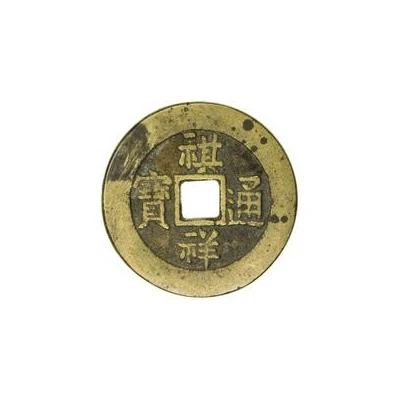


© Stephen Album Rare Coins
1 Cash - Qixiang Tongbao; Boo-yuwan ND
1861 year| Brass | - | 24 mm |
| Issuer | Empire of China |
|---|---|
| Emperor | Qing dynasty › Tongzhi (同治帝) (1861-1875) |
| Type | Non-circulating coin |
| Year | 1861 |
| Value | 1 Cash |
| Currency | Cash (621-1912) |
| Composition | Brass |
| Diameter | 24 mm |
| Shape | Round with a square hole |
| Technique | Cast |
| Orientation | Medal alignment ↑↑ |
| Demonetized | Yes |
| Updated | 2024-10-04 |
| Numista | N#226361 |
|---|---|
| Rarity index | 97% |
Reverse
Two Manchu words (read vertically) separated by the hole.
Script: Mongolian / Manchu
Lettering: ᠪᠣᠣ ᠶᡠᠸᠠᠨ
Translation: Boo-yuwan
Edge
Plain
Comment
When Tonghzi came to power in August of 1861, Qixiang was chosen as the original reign title, which was changed to Tongzhi in November after a coup. Few coins were cast with this reign title (and were only cast in August), and none were officially released for circulation.Interesting fact
One interesting fact about the Non-circulating coin 1 Cash - Qixiang (Tongbao; Boo-yuwan) ND (1861) from Empire of China made of Brass is that it features a unique blend of traditional Chinese and Western design elements. The obverse side of the coin depicts a portrait of the Guangxu Emperor, while the reverse side features a dragon and a phoenix, which are symbols of good fortune and prosperity in Chinese culture. The use of brass as the material for the coin was also a departure from the traditional use of silver or gold for Chinese coins, reflecting the empire's attempt to modernize its currency and economy during the late Qing period.